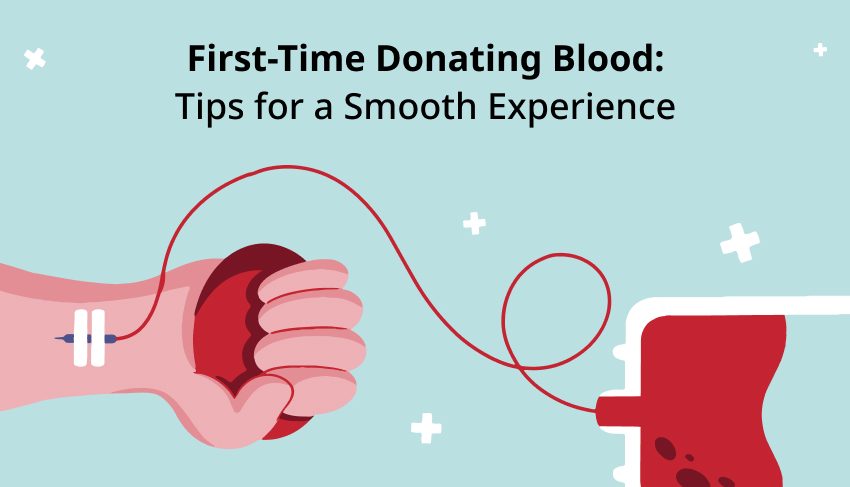There can be several causes about why you should donate blood. The most important is that it saves numerous lives. There are people who every day require blood transfusions to survive. By donating blood, you help them to get the required treatment.
However, if you are going to donate blood for the first time, you must know the tips and tricks of the blood donation process which will help you prepare, feel at ease, and donate blood seamlessly. With that being said let’s learn some basic steps that will help you start your blood donation journey.
What to Do Before Donating?
Before going to donate blood for the first time, you should check out the following factors for a better and smoother experience.
Check to see if you’re Eligible to Donate Blood: Although most people have the eligibility to donate you must meet the following criteria to get eligible.
- You should be a minimum of 18 years of age
- You must weigh more than 50Kgs
- You have to be in good health and not have any illnesses, or infections while donating blood
- Your hemoglobin levels should be more than 12.5 g/dl. Pulse – between 50 and 100/minute with no irregularities
- You should not be having any symptoms of cold, flu, sore throat, stomach bug, or any other infection
- Blood Pressure -Systolic 100-180 mm Hg and Diastolic 50 – 100 mm Hg. Temperature – Normal (oral temperature not exceeding 37.50C)
- If you have diabetes or hypertension then your pulse, blood glucose, and blood pressure levels should remain normal at the time of donation
People having these conditions are not recommended to donate blood.
- Body temperature remains above 99.5 oF
- Your body weight is below 45 kg
- If you have any chronic conditions such as HIV/AIDS, hepatitis, genital herpes, gonorrhea, syphilis, and certain cancers
- You have an active bacterial or viral infection, such as flu, cold, or COVID-19
- If you are taking drugs intravenously, or having unprotected sex with multiple partners
- If you are pregnant or breastfeeding
- If you have had a tattoo or body piercing done recently, then you have to wait six months from the date of the procedure to donate blood
- If you have traveled to places where mosquito-borne diseases such as dengue, and malaria are endemic, and Zika virus infection is found
- If you have taken treatment for malaria in the last 3 months
Finding Your Nearest Donor Centre: If you meet the above eligibility criteria then your next step should be to find a blood donation center near you. Once you find a centre you need to book an appointment online or in person for blood donation.
On the Day of Donation
The following points to be kept in mind before you donate blood for the first time.
Take enough rest and stay hydrated: It is essential to take ample rest and maintain proper hydration before you go for a donation. Taking rest and staying hydrated help ensure that your body is well-prepared for optimal donation.
Avoid working out: It is important to avoid rigorous workouts and intense physical activity before donating. It is because strenuous exercise may temporarily elevate your blood pressure and heart rate which can disqualify you from donating.
Avoid alcohol and smoking before donating: While smoking can impede the blood’s ability to carry enough oxygen, alcohol can lead to dehydration. Hence, try to stay away from these activities for at least 24 hours before your donation.
Don’t wake up too late the night before the donation: If you stay up too late at night before the donation it might make you feel groggy during the donation process. Getting a full eight hours of sleep is always a good idea before donating.
Eat a balanced meal: Ensure having a healthy, low-fat, and iron-rich meal at least 2-3 hours before donating. Because eating immediately before donation or donating on an empty stomach could lead to an upset stomach.
Hence sticking to a balanced meal 2-3 hours before donation would make your blood sugar level stable and you will experience a smooth donation. Further, an iron-rich meal can keep your iron levels intact even after donation.
Make yourself comfortable: Wearing a loose shirt with sleeves that can be easily rolled up can make your experience even smoother. Prepare yourself mentally to change someone’s life. Donating blood might seem like a small work but it certainly carries much importance because you are helping to save lives.
Bring a government-issued photo ID or your donor card: An ID of yours can help the staff know about your name, date of birth, and your overall identity. This can be your passport, government-issued ID card, or driving license. So bring your ID card to the donation center. When you donate blood for the first time you will receive a donor card which you can present at your subsequent appointments.
Complete your questionnaire: If you are going to donate blood for the first time, you will need to fill up a completely confidential questionnaire. This is only to ensure your eligibility to donate blood. Once you are set with the same, you will be able to fill out the questionnaire online for your subsequent donations.
Donating Blood
Once everything is done, it’s time to donate! You will be placed in a comfortable chair and your arm will be cleaned with an antiseptic. Then a sterile needle will be injected into your vein and the blood will be drawn into a bag. The needle used for your donation is used only once and then discarded. Once enough blood has been drawn, the staff will sanitize your arm and place a bandage on the site of the needle.
Usually, 450 ml of blood is extracted during a blood donation. This entire process takes about 10-15 minutes to complete. You will be asked to tense your muscles during the process of donation.
Post-Donation
Once you are done with the donation, you will be given a complimentary snack and drink. Make sure to eat them as soon as possible to stay afresh and feel well after the donation. However, if you feel dizzy or faint, inform the staff of the donation center. Avoid driving until you have fully recovered.
After you leave the center avoid strenuous activities like weightlifting for 24 hours. Once you reach home, make sure to consume iron-rich foods and drink adequate fluids to avoid adversities.
Frequently Asked Questions
How do I prepare for my first blood donation?
Before you wish to donate blood for the first time, check your eligibility criteria. Get enough rest the night before the donation. Eat a healthy low-fat meal 2-3 hours before your donation. Avoid strenuous activity before donating blood. Keep yourself hydrated enough before the donation process.
How do you feel after donating blood for the first time?
While donating blood, the only discomfort you may feel is the quick prick of the needle which lasts only for a moment. Once the needle goes in and settles in position, you should not feel any pain or discomfort. After blood donation, there may be little pain at the site but it usually goes away within a few days. Some people may experience bruising but it is usually harmless and disappears gradually.
The Final Words
Blood donation is a simple process that does not take much time yet is a philanthropic way to give back to society as well as make a difference in the world. Ultimately donating blood is important for many reasons such as helping those who need blood transfusions regularly, and treating various medical conditions like anemia, cancer, accidents, and injuries.

